Twitter Picks | Miners objected, Zcash similarly rejected the proposal, Jiang Zhuoer's second version of the BCH miner's tax proposal is in doubt
1. Miners objected, Zcash similarly rejected the proposal , Jiang Zhuoer's second version of the BCH miner's tax proposal was questioned
Jiang Zhuoer, the publisher of the "Miner Tax" proposal and the founder of the BTC.TOP mining pool, donated 12.5% of the block reward donated by BCH miners to fund the development of BCH. Update of the Miner Donation Program. Jiang Zhuoer said that the contents of this release are the results of recent discussions and his views (need to exchange views with other mining pools).
In the first version of the miner's donation proposal, it was proposed that 12.5% of the block rewards be allocated to the BCH Development Fund through a Hong Kong company to pay for development costs, cover the implementation of full nodes and other key infrastructure research and development for 6 months. The financing plan will receive a total of approximately $ 6,075,000 in funding.
The second version of the proposal changed 12.5% to 2-3% . The donation method refers to the ETH Foundation. Miners directly send part of the block rewards to projects that want to donate . At the same time, a miner foundation is established to maintain financial transparency . Miners can choose to send part of the block rewards that should be donated to the address of the black hole for destruction; the donation method is determined by voting of the computing power ; Jiang Zhuoer will use his personal 3500P computing power to mine under a new name. The second version of the proposal emphasizes that all BCH projects require funding , relying on corporate donations is not enough and will cause BCH to develop too slowly. In addition, before the start of the miner donation plan, the BCH Miner Fund will be established to accept donations from individuals and companies from miners and non-miners, and check the results through trial runs.
Original text of the second version of the proposal: https://www.weibo.com/ttarticle/p/show?id=2309404467111190724652
- Ethereum co-founder Vitalik Buterin: BCH is not Bitcoin
- Why is 2020 the year of opportunity for blockchain development?
- Morgan Creek CEO: If Bitcoin accounted for 1% of the portfolio over the past five years, it could outperform all portfolios.
After Jiang Zhuoer published the English version of the article on Read.cash, some members of the BCH community, including miners and developers, expressed their opinions through comments. Some members expressed their appreciation to Jiang Zhuoer for further community communication. Questions about the proposed donations of miners have focused on the following:
1) The proposal of miner donation is compulsory, which is not conducive to the safety of BCH
2) If the mandatory donation scheme is implemented, it will damage the economic principles / decentralization of BCH
3) Jiang Zhuoer questioned the contribution of BCH development and infrastructure construction (donation)
4) Not every BCH project is worth the donation
A commented member claimed to be a miner and believed that the updated plan was still a "bad" plan (it should not be continued). The miner asked Jiang Zhuoer whether he had made a donation in the recent fundraising activities (a total of 1,000 BCH was raised), whether he had made a donation to the BCH basic development, and the percentage of the donation that he held in his personal BCH. The miner stated that he had donated 2% of his holdings of BCH, and believed that Jiang Zhuoer's proposal was still suspected of forcing miners to donate and would reduce BCH security. The miner proposes to get more grants from the holders , and it is a voluntary and motivating way , rather than compulsively receiving a part of the block reward.
Another community member first thanked Jiang Zhuoer and the community for their continued communication. He believed that if the compulsory donation / burnout plan is implemented, it will have a harmful impact on voluntary initiatives, otherwise these initiatives may take root. It noted that only projects / companies with proven performance or potential would be worthy of donations and that development fund spending decisions should involve more independent observers rather than a few people. Regarding Jiang Zhuoer's proposal to avoid the tragedy of the commons, miners who do not want to donate may choose to destroy BCH, which indicates that this is not a "right" but an "obligation" and will cause the economic principles of BCH to change.
The chief developer of the Bitcoin Verde full node also left a message, saying that he has not communicated with Jiang Zhuoer so far, that the communication between the developer and the miner is very important, leaving a mailbox to expect further communication with Jiang Zhuoer.
Note: Read.cash communication post: https://read.cash/@Jiang_Zhuoer_BTC.TOP_CEO/bch-miner-donation-plan-update-a45daad6
In addition to members of the BCH community, V God and Zcash founder Zooko commented on the second version of the proposal. God V kept his eyes on the BCH Development Fund proposal, and reposted Jiang Zhuoer's update proposal as soon as possible, and added his own opinion:
If you want to know my position on this matter, my position on this is to take the public goods challenge seriously and to be willing to adjust ideological preconceptions while maintaining a commitment to core decentralized values to meet these challenges.

V God previously stated when the first version of the proposal came out that the practice of miners who did not follow the donation plan through solitary blocks was a compulsory soft fork, and believed that the problem of public goods was a systemic problem and required a systematic solution.
Zooko, the founder of Zcash who faced a halving in November 2020 and recently decided to set up a new development fund through community voting, retweeted V God (V God is the ECC technical consultant for Zcash and Zcash Development Corporation) and said that the second version of Jiang Zhuoer The proposal has the same mechanism as the Zcash solution that was rejected:
interesting! The " miner- led development fund " proposed by Jiang Zhuoer for BCH has the same mechanism as Andrew Miller's proposal for Zcash, but the mechanism was rejected : https://zips.z.cash/zip-1004 .

The solution mentioned by Zooko is a proposal issued in June 2019 and numbered ZIP1004. The proposal states that the proposal retains a portion (20%) of newly minted coins in each block as a development fund. A fixed set of developer entities will be eligible for these funds. Considering that miners in each block can determine how to allocate these funds to qualified developers, the fund is dominated by miners . The proposal mentions that the proposed development fund is not mandatory, and miners can decide for themselves whether to donate to the developer entity. The proposal uses a split of funds between two developers as an example to explain the currency-based transaction: assuming that there is a 3.125ZEC block reward during the second halving period, it is allocated to 2.5ZEC to the miners, and 0.3125ZEC to the two developer entities .
According to a blog post published by the ECC in September 2019, including the above proposals, the Zcash community explored a total of 16 proposals . For these 16 proposals, Zcash Development Corporation ECC stated that its evaluation criterion is "Is ECC committed to the mission while accepting the work of the fund ?" Regarding the ZIP1004 proposal, the Zcash development company ECC rejected it and made a statement:
ECC does not accept special stakeholders (such as the miners in this example ) to control the direction of ECC . If we work under these terms, we run the risk of being forced to choose between harming our mission or not being funded by special interests . For example: What if a Zcash user wants to develop a consensus algorithm to include proof of stake, but the miner on the proof of work side refuses? Or, what if the dominant coalition of miners requires a change that would be detrimental to the few competing miners? In addition, FinHub states that "restricting the supply or ensuring the scarcity of [a cryptocurrency] through repurchases," destroying "or other activities" is a factor in determining whether the cryptocurrency is subject to securities regulations.
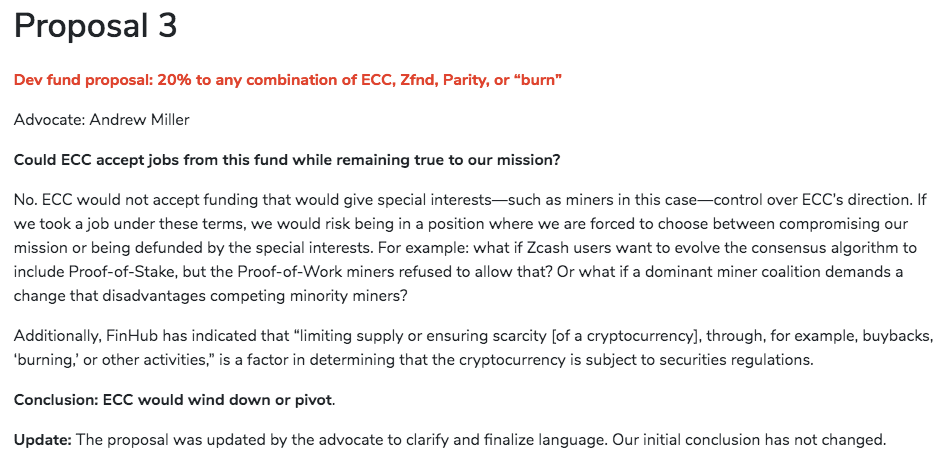
ECC announced on January 29, 2020 that through community voting, Zcash will establish a new development fund with 20% mining rewards, of which 7% will be allocated to ECC, 5% will be allocated to Zcash Foundation, and 8% will be used for Donations support third-party Zcash businesses.
2. BM: Not using blockchain technology in the next few years is like banks not using SSL
EOS founder Daniel Larimer (BM) gave a speech on end-to-end security design, the risks of traditional databases and passwords, the future of blockchain and the problems it solves at the Government Blockchain Association in the United States. Block.One's official tweet posted some of BM's speeches:
In the next few years, not using blockchain technology is like banks not using SSL (a security protocol). Once the technology is widely used, I don't think that using blockchain technology may be considered negligent.
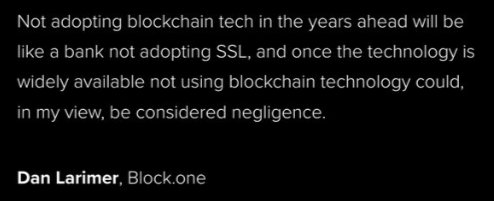
Blockchains and development frameworks such as EOSIO exist because they allow application developers to build secure applications without having to reinvent the "database".
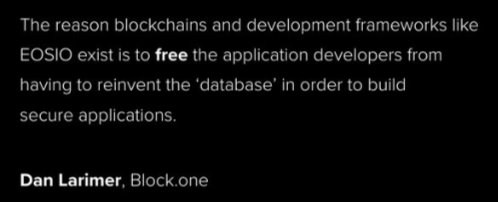
Contrary to popular belief, a blockchain may not necessarily run slowly and be inefficient, and it may not necessarily be an anti-censorship, open access database. A blockchain can provide companies with overall integration in security, auditability, transparency, and business processes. Provide huge improvements, even if the blockchain is run entirely by the company, even if all data on the blockchain is made public.
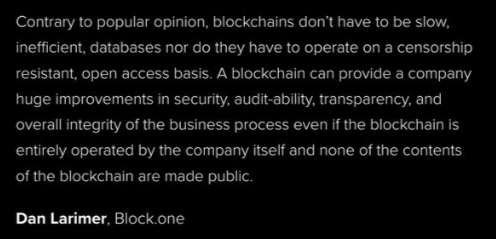
BM himself added in a subsequent tweet:
Any database that wishes to evolve to blockchain-level security needs to be programmable, deterministic, and directly manage end-user accounts. The storage process is far from smart contracts. The practice of separating business logic from database integrity was severely disrupted.
In theory, eosio can be built on any key / value database. Actually, I haven't found a product with higher performance. We are working to make querying blockchain status as scalable and easy as sql / mongo.
Eosio is much easier to evolve into a database / application server than an existing database has evolved to be more secure.
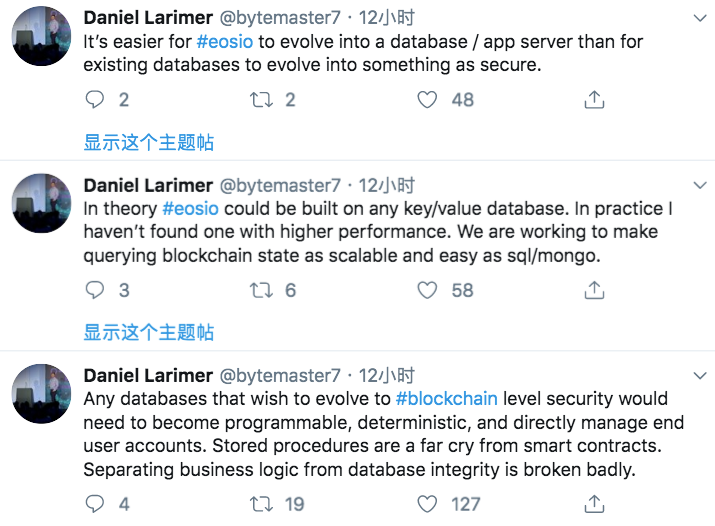
According to the official website, the Government Blockchain Association (GBA) is an international non-profit professional association with its headquarters in Fairfax, Virginia. GBA members are individuals and organizations interested in introducing blockchain technology solutions to the government. The conference was held in the United States Congress, and the conference presentation showed that the conference participants included government leaders from around the world discussing the 2020 plan, focusing on blockchain technology and cryptocurrencies. Speakers include global legislative and executive leaders from local, state, and national government agencies. In addition to BM, the main speakers are Bitcoin advocates, well-known Silicon Valley investor Tim Draper, and blockchain father Scott Stornetta.
3. Industry News
a. Jeremy Welch, the CEO of the crypto escrow company Casa, a crypto escrow company focusing on simplifying self-hosting and private key management of crypto users, left. The new CEO is Nick Neuman, product manager, and Casa's business focus will shift from hardware to software.
b. Autonomous Partners founder Arianna Simpson will join the well-known venture capital fund Andreessen Horowitz as a trading partner starting in March. Simpson has stated that only zero-knowledge proofs can solve the PoS centralization problem.
c. The new project xx network of the electronic cash inventor David Chaum was included in the Messari Registry. xx network is a consumer-scale online platform where users can share information and exchange value without risk of data exposure.
d. Tokenanalyst report states that as of January 27, 2020, five Chinese mining pools controlled by BitDeer, AntPool, BTC.com, BTC.TOP, F2Pool, and ViaBTC, controlled bitcoin 49.9% through BitDeer, a shared mining platform under Bitmain Computing power.
e.CoinMetrics data shows that since September 2019, Tether's transaction volume in Omni, Ethereum and Tron has continued to grow rapidly, and is currently at an historical high with an average annual flow rate of 46.
f. The Kraken Security Lab has disclosed a method of extracting seeds from the hardware wallets Trezor, Trezor One and Trezor Model T. This method requires only 15 minutes of physical access to the device. Kraken reminds hardware wallet users not to allow anyone to access the wallet and to enable the BIP39 passphrase using the Trezor Client.
g.Skew data shows that CME futures trading volume is in an upward trend, and as of January 30, it has generated 800 million US dollars in transaction value, the highest since the data on June 27, 2019.
h.Financial Times published an article entitled "Half Bitcoin halved will not increase prices", stating that the supply of Bitcoin will not be halved, but increased, and will continue to increase to 2140, so according to the principle of supply and demand, the halving It will not cause prices to rise. Bitcoin has been in the process of printing money since its inception.
i.The Block reports that the US Commodity Futures Trading Commission (CFTC) chairman Heath Tarbert said in an interview with Bloomberg on Thursday that the crypto market may see the launch of ETH-based futures contracts.
Disclaimer: The opinions of institutions and people in the text do not represent the position of The Block Hub and do not constitute investment advice.
We will continue to update Blocking; if you have any questions or suggestions, please contact us!
Was this article helpful?
93 out of 132 found this helpful
Related articles
- Mimblewimble can realize non-interactive transactions, Litecoin, Grin, etc. will benefit
- Blockchain's Transformation of the Computing Power Industry | Return to Common Sense
- Coin Metrics: USDT market usage is optimistic, tokens transfer on average every 8 days
- How many entities hold Bitcoin? These 7 exchanges are worth watching
- 4D Long Text: Underrated Ethereum
- US presidential candidate Andrew Yang likes Bitcoin? These 7 points can prove
- Bai Shizhen: Proposal to issue encrypted digital currency "belt currency" to improve cross-border payment systems in countries along the "Belt and Road"




